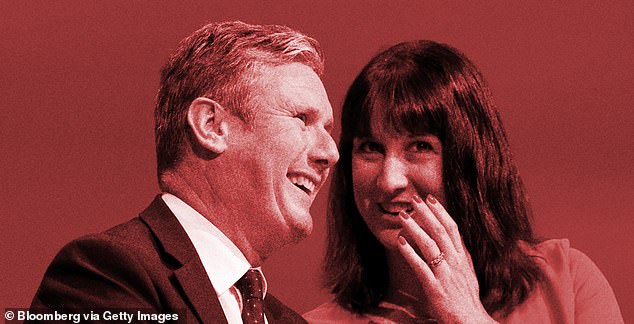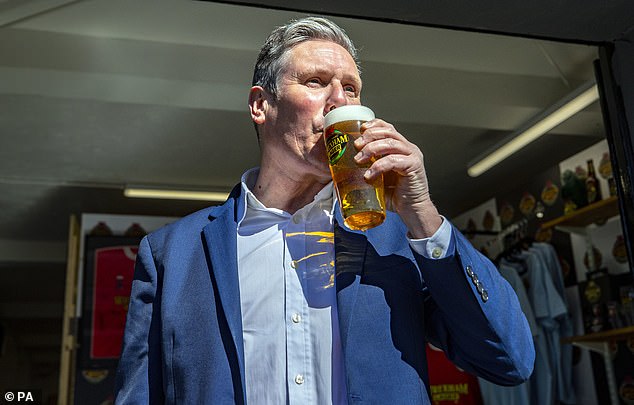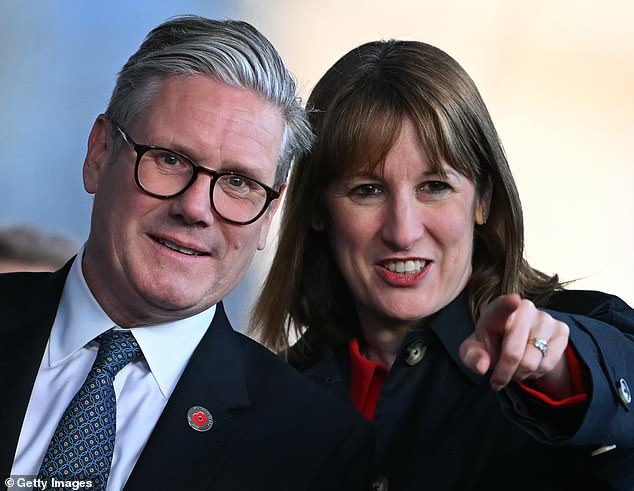Watching the Labour Government trying to manage the UK economy is like watching an alcoholic trying to deal with a lifetime of addiction.
They know the bottle of whisky is there in the cupboard. It’s called the old tax and spend. They know that they love the taste of it – the rush of that first glug – but they also know deep down that just unscrewing the cap of that bottle is going to be a disaster, for them and for their families.
An alcoholic knows in their soul that the booze will always defeat them. They know they can’t control it. They know that it will ultimately make them less energetic, less productive, less resilient. They know that drink can do huge damage to their relationships, even cost them their jobs.
But, at the moment they give in to the craving and tip-toe to that bottle, they just can’t see it like that.
All they can think of is the immediate sense of release from the stress, the instant numbing of the hurt or whatever is troubling them in their lives. At that moment of weakness they can’t see the truth – that going back to the bottle is just going to make things worse, and then worse.
That is where we are with the economy under Reeves and Starmer – in a doom loop that started last year, almost as soon as they got in.
Before the July 2024 election, you may remember they promised they would not raise taxes on working people, and the voters broadly took this as a reassurance that the old habits had changed. That was the right thing to say, and it would have been the right thing to do.
Thanks to the disasters of the Covid pandemic, we were already living in a world where taxes as a share of national income were at an all-time high – 40 per cent or more – and predicted to go higher.

For four months, between the election victory and the October Budget, everybody could see that Labour … were going back to the old tax and spend. They were back on the sauce

In their first few months in office, Labour said to themselves, to hell with it, let’s take a risk, and they took a great greedy gulp of the old tax and spend
This was the moment for Labour to do what Blair did in 1997, and stick with Tory spending plans. This was the moment to carry on with Tory initiatives to cut the size and cost of the public sector, and if possible to put some cash back into the pockets of the people, because all economic experience shows that encouraging private enterprise is the best – if not the only – way to stimulate the growth this country needs.
As soon as Labour came in, alas, the story changed. Suddenly they were splurging the cash – on public sector pay rises, on the railway unions, on salaries in the NHS.
They began blatantly paying back the Left-wing special interest groups – above all the unions – that had helped deliver their victory. They did so in defiance of economic logic, and they made settlements over and above the rate of inflation – sometimes more generous than the unions were even expecting. At the same time they started trash-talking the economy, warning that there was a black hole in the finances, so that everyone could see what was coming.
For four months, between the election victory and the October Budget, everybody could see that Labour had lost the battle of will. They were going back to the old tax and spend. They were back on the sauce. Everyone could see – they made little attempt to hide it – that Reeves and Starmer were going to whack up taxes in the autumn.
That sense of dread was bad enough in itself, and it went on for week after week. It hit confidence and froze investment. The exodus of talent and wealth creators started to grow. And then, when it came, the budget was actually far worse than anyone had expected.
With a £40 billion tax grab, they put up national insurance contributions for almost every business in the country. They clobbered the poor farmers with an unfair tax on their land, leading at least some to commit suicide. They lashed out spitefully at the private schools, hitting them with 20 per cent VAT, even though the subsequent closures have just added to the burdens of the maintained sector.
In their first few months in office, Labour said to themselves, to hell with it, let’s take a risk, and they took a great greedy gulp of the old tax and spend, and we all watched in dismay as the fluid trickled down their incontinent chins.
Did it do them any good? Did it do the UK any good? Of course not. As with the booze, the policy exacerbated the very problems it was meant to solve.

Reeves and Starmer have plunged the UK economy into a doom loop that started almost as soon as they got in
The rise in NICs further discouraged corporate investment, and stopped employers expanding their payroll. Growth has been anaemic – forecast at 0.3 per cent this year. Confidence has been bumping along the bottom, and I’m afraid the wealth creators have been fleeing Britain faster than any country in the world except China.
I remind you that in Keir Starmer’s Britain, the 19th biggest city is now Dubai. We are now coming up to a year of this alcoholism, and the problem is getting worse.
They began boldly, saying they were going to pay for some of their spending by cutting welfare; and again, that was – and is – absolutely the right thing to say, and the right thing to do.
We have about 43 million people of working age in this country, and yet we have 11 million – about a quarter of the total workforce – who are not in employment.
Of the 11 million, only about 1.6 million are actually looking for jobs. The rest are simply workless, on sickness or disability benefits, and much though one may sympathise with such people it cannot be right that we have a higher proportion of such state-funded worklessness than any other comparable country.
The costs are huge, and they are growing, and they are a ball and chain around UK productivity.
Labour first assured us that they were going to make some cuts. They were going to be tough. They were going to means-test the winter fuel allowance for the elderly. They were going to reform the PIPs – the packages of funding for people with disabilities. They were going to continue with the two-child cap for child benefit, even though it was unpopular with the Left.
Once again, however, their resolve has wilted. They have panicked after the local election results, and Starmer has decided he just can’t do it.
He has the majority; he has the mandate; but he hasn’t got the willpower, he hasn’t got the guts to see it through. So where are they going to find the money to fund their moral weakness, their failure to prune this vast and growing public expenditure?
Well, you know where. They know the bottle is in the cupboard – the fiery anaesthetic draught of the old tax and spend. After the disaster of the October 2024 budget, Rachel Theeves said she didn’t want to do anything like that again, and that she didn’t want another tax-raising budget of that kind.
Who now thinks she will stick to her pledge? She’s being driven to raise more taxes this coming autumn, and the reason is at least partly because she clobbered the economy with taxes last autumn.
That’s why they call it a doom loop, and that is why they are like alcoholics – because they have made such a mess that they think the only way out is to have another drink.
This time she is said to be looking at the tax-free contributions you can make to your pension, or some other income tax for high earners. Some say it could be corporation tax.
Exactly as we did last year, we will watch and wait to see what taxes Labour decide to put up, while the uncertainty undermines investment and confidence.
One thing we know for sure: they will be back on the tax and spend, 80 per cent proof, with the same disastrous results.
This country can’t go on like this, with a government seemingly clinically dependent on the wrong set of policies. We need to snap out of it. We need to stop this drunken spending spree.
Just in the last week it’s been calculated that Labour added another £50 billion to public spending, if you tot up the cost of the Chagos surrender, the EU sell-out, the U-turn on the winter fuel allowance and the extra cash for the NHS.
We can’t keep going with a Covid-era approach to the size of government. We can’t afford more wage costs and non-wage costs for British business, and we can’t afford the crazed eco-zealotry of Ed Miliband. Until we have got enough baseload nuclear power, and until we have got much more reliable renewable energy, we need to recognise that hydrocarbons will have to play a major part in our power generation.
We need to restart the North Sea, and we should drop our superstitious hatred of onshore reserves. There’s enough gas under Lincolnshire alone to keep the UK supplied for ten years.
We face huge demand for electricity from AI, and the UK already has the most expensive energy in Europe. We should have the cheapest, for industry and consumers alike – and we could.
Kemi Badenoch has already spelt out much of this agenda, and in the past few days it has become obvious that only the Conservatives can do it.
The Leader of the Opposition is facing the most Left-wing government since the 1970s – but she not only has socialists on her left. She now has a socialist party on her right, in the sense it has become clear that, like Labour, the so-called Reform party do not want to cut welfare bills (Reform what, eh?). Indeed, if I understand things right, they want to spend more on welfare, which is the last thing this country needs.
Above all we need to stop persecuting the wealth creators. When I was Mayor of London I used to boast that we had more billionaires than any other city in the world – and it was true. London was to the billionaire, I said, as the jungles of Sumatra are to the orangutan. The UK capital is their natural habitat.
And when I said it everyone understood that this was not only good for London, but also for levelling up, in the sense that those billionaires were driving jobs and investment across the country.
We need to restore this country’s reputation as a place where wealth creators are supported and applauded, and we need to snatch the bottle of old tax and spend from the lips of the Starmer government – or they will give us a hangover that lasts for decades.











